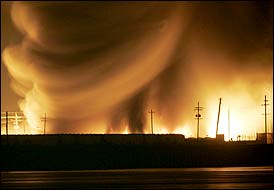
From the front page of the NYTimes comes this picture of
New Orleans' latest hell:
"The explosion was in a chemical storage facility near the Mississippi River, Lt. Michael Francis of the Harbor Police was quoted as saying by The Associated Press. A series of smaller blasts followed and then acrid, black smoke hundreds of feet high. The vibrations were felt all the way downtown. "
I wondered when this part of it would start. Check out
Chris Mooney's prescient description of the events now playing out,
written 4 months ago:
"In the event of a slow-moving Category 4 or Category 5 hurricane (with winds up to or exceeding 155 miles per hour), it's possible that only those crow's nests would remain above the water level. Such a storm, plowing over the lake, could generate a 20-foot surge that would easily overwhelm the levees of New Orleans, which only protect against a hybrid Category 2 or Category 3 storm (with winds up to about 110 miles per hour and a storm surge up to 12 feet). Soon the geographical "bowl" of the Crescent City would fill up with the waters of the lake, leaving those unable to evacuate with little option but to cluster on rooftops -- terrain they would have to share with hungry rats, fire ants, nutria, snakes, and perhaps alligators. The water itself would become a festering stew of sewage, gasoline, refinery chemicals, and debris...
A direct hit from a powerful hurricane on New Orleans could furnish perhaps the largest natural catastrophe ever experienced on U.S. soil. Some estimates suggest that well over 25,000 non-evacuees could die. Many more would be stranded, and successful evacuees would have nowhere to return to. Damages could run as high as $100 billion. In the wake of such a tragedy, some may even question the wisdom of trying to rebuild the city at all. And to hear hurricane experts like Louisiana State University's Ivor van Heerden tell it, it's only a matter of time before the "big one" hits.
Currently, pretty much every long-term trend cuts against the safety of New Orleans. Levees are subsiding; coastal wetlands (which can slow storm surges) are continually disappearing; and sea levels are rising. And then there's global warming -- a warmer world with warmer ocean temperatures should theoretically experience worse hurricanes. Most importantly, the Atlantic Ocean appears to have entered an active hurricane cycle, with the potential to fling storms at the Gulf Coast for years to come. This puts New Orleans on the vanguard among U.S. coastal cities (including New York) that will have to think hard about their growing vulnerabilities in the coming years. The process of deciding how to save an entire coastal metropolis has begun, but the discussion has largely been confined to experts, and not nearly broad or ambitious enough yet."
Chris was on the BBC this morning, talking about New Orleans. But this isn't the time for laying blame, is it? Not the time to play politics. Not the time to wag fingers. Thank God for the clear vision of
James Wolcott.
 From the front page of the NYTimes comes this picture of New Orleans' latest hell:
From the front page of the NYTimes comes this picture of New Orleans' latest hell: